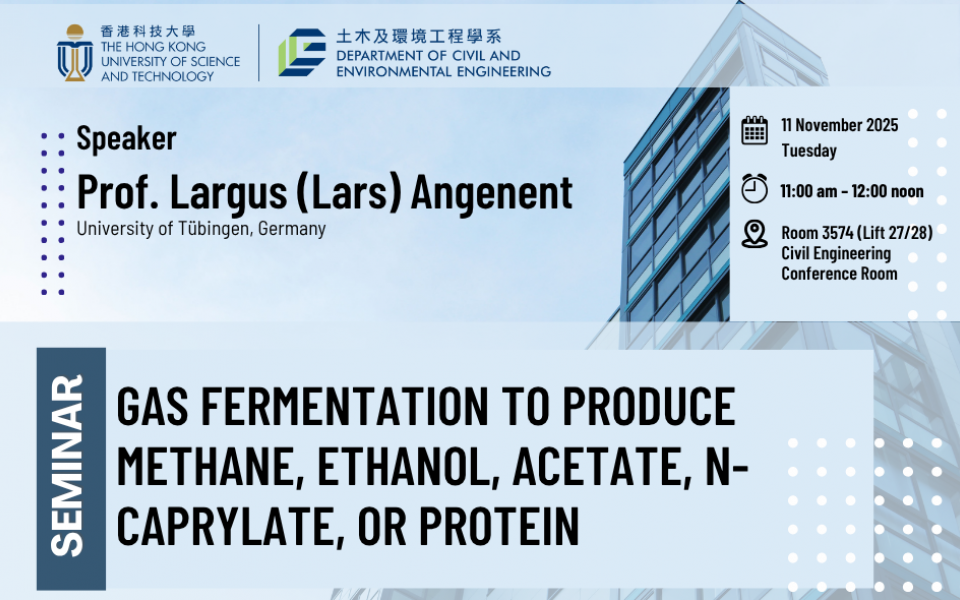Civil Engineering Departmental Seminar - Gas Fermentation to produce methane, ethanol, acetate, n-caprylate, or protein
Supporting the below United Nations Sustainable Development Goals:支持以下聯合國可持續發展目標:支持以下联合国可持续发展目标:
Gas Fermentation to produce methane, ethanol, acetate, n-caprylate, or protein
The presentation will cover several key areas, including power-to-methane, syngas fermentation followed by microbial chain elongation, and a two-stage gas fermentation system for producing human food. The latter topic is pertinent to mitigating greenhouse gas emissions. The conventional agricultural and food sector has a huge impact on climate change. Not only does this sector produce 30% of global greenhouse gas emissions, but half of the world’s habitable land is used for agriculture. The previous and current changes in land use may have an even larger impact on the climate than just GHG production. This is especially true for the inefficient use of primary sources, such as water, for plant growth as animal feed, and the enormous resources that animal husbandry requires for protein production. Potent greenhouse gas emissions, such as those from CH4 and N2O, are particularly associated with animal husbandry. We are building a carbon-neutral food production platform that addresses multiple food categories, including bulk protein. Our solution centers on acetate. This simple two-carbon molecule can be produced from renewable energy-derived H2 and captured CO2, as well as other sources, and is readily consumed by various microbes. Since acetate can enter the central metabolism of many different microbes, it can be efficiently converted into key societal commodities, ranging from fine chemicals to food. Furthermore, many microbes that grow on acetate have precedent in the food industry. Therefore, our solution has a wide scope and scale; however, we focus specifically on bulk protein and specialty food ingredients. This is translational because we are developing a relatively inexpensive protein product with ideal functional food properties to aid in replacing animal protein, thereby feeding our populations efficiently.
Largus Angenent studied environmental science at Wageningen University in the Netherlands before obtaining his doctorate in environmental engineering from Iowa State University in the USA in 1998. After postdoctoral stays in Illinois and Colorado, he was appointed assistant professor at Washington University in St. Louis in 2002. In 2008, Angenent moved to Cornell University, first as an associate professor and, from 2015, as Professor of Biological and Environmental Engineering. The University of Tübingen appointed him as a Humboldt Professor in 2017; he has also been a Fellow at the Max Planck Institute for Biology in Tübingen since 2019. He also holds a 15% professor position in the Biological and Chemical Engineering Department of Aarhus University in Denmark, where he is also one of 10 PIs in the CO2 Research Center (CORC), which is funded by the Novo Nordisk Foundation. He was also an NSF career awardee.
The Leibniz Prize, which is Germany’s most prestigious research funding award, was awarded to Largus Angenent for his outstanding work in the field of environmental biotechnology, which has led to key contributions to microbial electrochemistry. Angenent is one of the worldwide founders of this field of research and co-founder of the International Society for Microbial Electrochemistry and Technology, established in 2011, which he also chaired as president. He is also a leader in the field of microbial chain elongation and actively organizes worldwide conferences in this field. His work is highly topical in view of climate change and the resulting need for a sustainable food, chemical, and energy economy. Angenent has also successfully applied his academic accomplishments in practical settings through two start-up companies.
